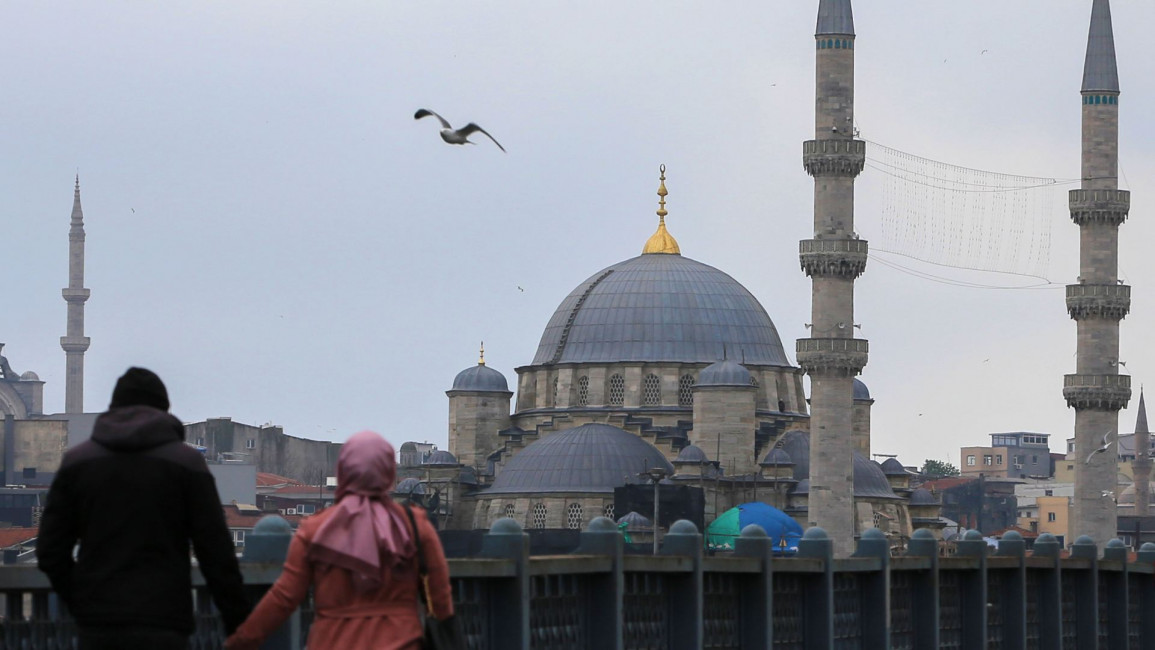Turkey issues Ramadan coronavirus restrictions, hoping for 'return to normal' at Eid
Turkey issues Ramadan coronavirus restrictions, hoping for 'return to normal' at Eid
Ankara will ban some gatherings and restrict food shopping hours during the holy month.
2 min read
More than 2,200 people have died from the Covid-19 illness in Turkey [Getty]
Turkey has introduced a number of new restrictions to prevent the spread of the novel coronavirus during the Muslim holy month of Ramadan after which President Recep Tayyip Erdogan hopes for a "return to normal life".
"We aim to achieve maximum observance of measures during the month of Ramadan and, God willing, a transition to normal life for our country after the holiday," Erdogan was quoted as saying on Tuesday by state news agency Anadolu.
The president said that Turkey's Covid-19 case numbers were beginning to plateau, although medics and government critics have raised concerns over the figures and the government's handling of the pandemic.
The country has witnessed the worst outbreak outside of Europe and the US according to official data, with confirmed cases of the virus rising to more than 95,000 on Tuesday. So far 2,259 people have died from the Covid-19 illness.
The Muslim holy month, which is expected to begin either on Thursday or Friday evening this week, will see the introduction of a number of new measures to contain the virus' spread.
Ankara has declared a four-day curfew in 30 cities and one province starting on Thursday. While weekend curfews implemented over the past two weeks have completely prevented residents from leaving their homes, visits to food shops before 2pm on Thursday and Friday will be allowed.
Mosques have already been closed for communal prayers, with Turkey's top religious authority on Monday saying worshippers should pray traditional Ramadan evening prayers with their families at home.
On Wednesday, the Interior Ministry issued new restrictions on shopping hours and gatherings throughout Ramadan.
Bakeries will not be allowed to sell the traditional and highly-popular Ramadan bread within two hours of Iftar, the evening fast-breaking meal, in order to prevent crowding. Marketplaces will also be controlled in order to enforce social distancing and the wearing of face masks, which is obligatory in Turkey.
Outdoors tents where people usually gather to break their fast - often with free food provided by municipalities or charities - will be banned.
Streets that may be crowded could also be closed during meal times in the holy month, and visits to shrines will be restricted.
Ankara has avoided implementing a stricter nationwide lockdown over the course of the crisis, a move analysts say is motivated by a desire to keep an already hard-hit economy afloat.
Follow us on Facebook, Twitter and Instagram to stay connected
"We aim to achieve maximum observance of measures during the month of Ramadan and, God willing, a transition to normal life for our country after the holiday," Erdogan was quoted as saying on Tuesday by state news agency Anadolu.
The president said that Turkey's Covid-19 case numbers were beginning to plateau, although medics and government critics have raised concerns over the figures and the government's handling of the pandemic.
The country has witnessed the worst outbreak outside of Europe and the US according to official data, with confirmed cases of the virus rising to more than 95,000 on Tuesday. So far 2,259 people have died from the Covid-19 illness.
The Muslim holy month, which is expected to begin either on Thursday or Friday evening this week, will see the introduction of a number of new measures to contain the virus' spread.
Ankara has declared a four-day curfew in 30 cities and one province starting on Thursday. While weekend curfews implemented over the past two weeks have completely prevented residents from leaving their homes, visits to food shops before 2pm on Thursday and Friday will be allowed.
Mosques have already been closed for communal prayers, with Turkey's top religious authority on Monday saying worshippers should pray traditional Ramadan evening prayers with their families at home.
 |
| [Click to enlarge] |
On Wednesday, the Interior Ministry issued new restrictions on shopping hours and gatherings throughout Ramadan.
Bakeries will not be allowed to sell the traditional and highly-popular Ramadan bread within two hours of Iftar, the evening fast-breaking meal, in order to prevent crowding. Marketplaces will also be controlled in order to enforce social distancing and the wearing of face masks, which is obligatory in Turkey.
Outdoors tents where people usually gather to break their fast - often with free food provided by municipalities or charities - will be banned.
Streets that may be crowded could also be closed during meal times in the holy month, and visits to shrines will be restricted.
Ankara has avoided implementing a stricter nationwide lockdown over the course of the crisis, a move analysts say is motivated by a desire to keep an already hard-hit economy afloat.
Follow us on Facebook, Twitter and Instagram to stay connected



